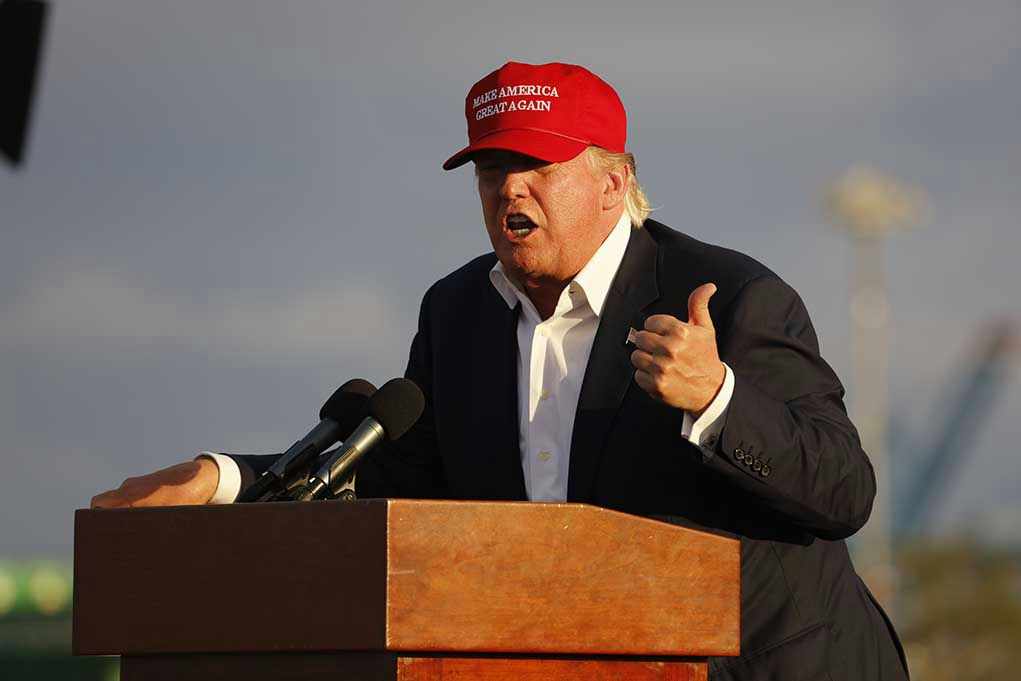
A sitting U.S. President just told hundreds of senior military leaders that he calls nuclear weapons the “n-word,” drawing an explicit parallel to America’s most inflammatory racial slur while threatening to demote any officer who disagreed with his policies.
Story Highlights
- Trump addressed hundreds of senior military leaders at Quantico, using racially charged language to describe nuclear weapons
- Defense Secretary Pete Hegseth unveiled sweeping anti-“woke” military reforms during the same controversial meeting
- The President directly threatened career military officers with demotion for disagreeing with administration policies
- Military experts and lawmakers condemned the unprecedented breach of presidential decorum and military protocol
The Quantico Confrontation That Shattered Military Norms
The meeting at Marine Corps Base Quantico was supposed to be a routine address to military leadership. Instead, it became a 72-minute spectacle that redefined the boundaries of presidential discourse. Trump’s decision to equate nuclear terminology with a racial slur represents an unprecedented moment in American civil-military relations, one that career officers described privately as both shocking and deeply inappropriate.
The timing couldn’t have been more significant. This wasn’t a campaign rally or casual interview—this was the Commander-in-Chief addressing the very officers responsible for America’s nuclear arsenal and national defense strategy. The deliberate nature of the comparison, delivered to an audience of seasoned military professionals, suggests either a stunning lack of awareness or a calculated attempt to provoke.
Hegseth’s Military Culture War Reaches Full Throttle
Defense Secretary Pete Hegseth seized the moment to announce ten new military directives targeting what the administration calls “wokeness” in the armed forces. These sweeping reforms include stricter physical standards, revised grooming requirements, and what sources describe as a comprehensive overhaul of diversity and inclusion programs. The simultaneous rollout alongside Trump’s inflammatory rhetoric appears strategically coordinated.
The reforms represent more than policy changes—they signal a fundamental shift in how civilian leadership views military culture. Hegseth’s announcement that officers who resist these changes could face career consequences transforms routine policy implementation into an ideological litmus test. This approach risks creating a military leadership selected more for political loyalty than operational competence.
Military Leadership Faces Unprecedented Pressure Campaign
Retired Lt. Gen. Mark Hertling’s public criticism of Trump’s remarks as “shocking” and “offensive” reflects broader concern within military circles about the politicization of military service. The Pentagon’s refusal to release a complete attendee list suggests internal disagreement about the event’s appropriateness, while the absence of public statements from active-duty leaders speaks volumes about the pressure they face.
Senators Tammy Duckworth and Mazie Hirono have raised legitimate concerns about how this rhetoric affects military readiness and national security credibility. When America’s military leadership operates under threat of career destruction for expressing professional disagreement, the quality of strategic advice inevitably suffers. This isn’t about political correctness—it’s about maintaining the professional military advice that keeps America safe.
The Broader Stakes Beyond Controversial Language
The Quantico event occurs against a backdrop of National Guard deployments to major cities and Trump’s continued references to combating “the enemy within.” These domestic military deployments, combined with threats to military leadership and racially charged presidential rhetoric, create a concerning pattern that extends far beyond inappropriate language choices.
The real question isn’t whether Trump’s language was offensive—it clearly was. The critical issue is whether American military institutions can maintain their professional integrity and operational effectiveness when subjected to this level of political pressure and inflammatory rhetoric. History suggests that militaries perform best when led by professionals chosen for competence rather than political compliance, and when civilian leadership respects rather than ridicules institutional norms.
Sources:
Trump threatens to fire military leaders who disagree with him at Quantico meeting
Trump wants to stop nuclear proliferation; STRATCOM could play a major role




